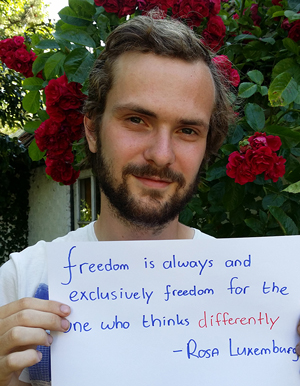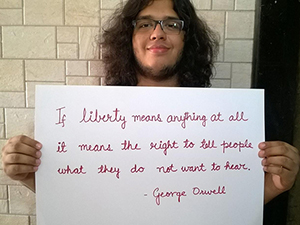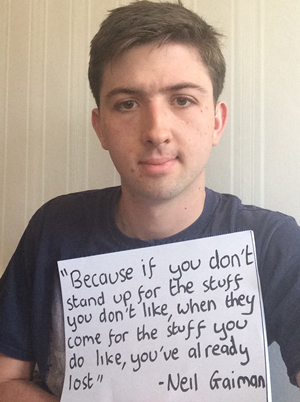19 Aug 2015 | mobile, News, United States, Youth Board
This is the fifth of a series of posts written by members of Index on Censorship’s youth advisory board.
Members of the board were asked to write a blog discussing one free speech issue in their country. The resulting posts exhibit a range of challenges to freedom of expression globally, from UK crackdowns on speakers in universities, to Indian criminal defamation law, to the South African Film Board’s newly published guidelines.

Muira McCammon is a member of the Index youth advisory board. Learn more
Guantanamo Bay (GiTMO) is a place where language barriers embody part of the institution’s social architecture.
Two years ago, Peter Jan Honigsberg of the University of San Francisco wrote about linguistic isolation, using the experiences of an Uzbek detainee to highlight this reality. But, we know that during various points throughout GiTMO’s history, dictionaries have been used and even written by detainees. In March 2004, the U.S. Joint Task Force Guantanamo published a revision of its 2003 Camp Delta Standard Operating Procedure, adding “dictionaries” to the list of materials banned from the Guantanamo Bay detainee library. There was no immediate reason given for this policy change, even though, according to a report later released by the US Department of Defense, detainees speak over 18 native languages.
Furthermore, Mahvish Khan, an interpreter and Pashtun-American lawyer, published My Guantanamo Diary: The Detainees and the Stories They Told Me. In the book, Khan shared this anecdote about Taj Mohammad, a then twentysomething from Kunar, Afghanistan:
“He asked us repeatedly to bring him a Pashto-English dictionary so that he could improve his English. Over several months, he had compiled and memorised a list of almost one thousand English words. But during a routine search, the guards had found and confiscated his neatly written glossary.”
Speech is a fickle concept in detention centres, and the story of Mohammad’s confiscated, self-written lexicographic resource raises questions about how detainees in GiTMO or any detention centre for that matter can effectively combat linguistic isolation.
Muira McCammon, USA
Related:
• Ravian Ruys: Without trust, free speech suffers
• Jade Jackman: An act against knowledge and thought
• Harsh Ghildiyal: Defamation is not a crime
• Tom Carter: No-platforming Nigel
• Matthew Brown: Spying on NGOs a step too far
• About the Index on Censorship youth advisory board
• Facebook discussion: no-platforming of speakers at universities
19 Aug 2015 | mobile, Netherlands, News, Youth Board
This is the sixth of a series of posts written by members of Index on Censorship’s youth advisory board.
Members of the board were asked to write a blog discussing one free speech issue in their country. The resulting posts exhibit a range of challenges to freedom of expression globally, from UK crackdowns on speakers in universities, to Indian criminal defamation law, to the South African Film Board’s newly published guidelines.

Ravian Ruys is a member of the Index youth advisory board. Learn more
“Haat imam” is a man whose life solely depends on the complete destruction of western values and interests, or so one would think if you were reading or watching the Dutch media.
It is a word used whenever we are talking of an imam whose views are considered either too conservative or too radical. In most cases, when someone is labelled a haat imam, they are subject to protest or no-platforming. In 2015, there have been three known cases of events being cancelled because some of the speakers were labelled haat imams. In these incidences, the individuals involved were investigated by Dutch security services and considered safe, meaning they were found to have no known links to terrorist organisations.
All this has led the Volkspartij voor Vrijheid en Democratie (People’s Party for Freedom and Democracy), a political party currently in power, to advocate a blacklist for radical preachers. The party warns that this blacklist should not only include those Muslim preachers who have known links to terrorist organisations, but also those who spread hate.
This means public pressure leads to the narrowing of freedom of speech for one specific group of people. It has also created a feeling of persecution surrounding young Muslims, made even worse by the deputy prime minister quoting flawed scientific research stating that 80 per cent of young Dutch-Turks support ISIS.
If you are a Muslim in the Netherlands, you are now in an environment where you feel you must be the nicest Muslim anyone has ever met or you can’t be trusted. Perversely, this lack of trust is often quoted as one of the things that drives young Muslim men and women into the arms of extremist organisations. Consequently, a policy trying to protect us against extremist propaganda works in favour of the extremists.
The Netherlands has a great reputation when it comes to freedom of speech and we should keep it that way. This means creating a fair and equal space for Muslims in our country to debate their religion on their terms. We might not always like what we hear, but we cannot intervene directly unless a direct threat is made against innocents. If we do not trust those involved, in other words, if we do not trust our fellow countrymen, how can we expect their trust in return?
Without trust, politics and civil society become a bloody mess.
Ravian Ruys, The Netherlands
Related:
• Muira McCammon: GiTMO’s linguistic isolation
• Jade Jackman: An act against knowledge and thought
• Harsh Ghildiyal: Defamation is not a crime
• Tom Carter: No-platforming Nigel
• Matthew Brown: Spying on NGOs a step too far
• About the Index on Censorship youth advisory board
• Facebook discussion: no-platforming of speakers at universities
18 Aug 2015 | India, mobile, News, Youth Board
This is the third of a series of posts written by members of Index on Censorship’s youth advisory board.
Members of the board were asked to write a blog discussing one free speech issue in their country. The resulting posts exhibit a range of challenges to freedom of expression globally, from UK crackdowns on speakers in universities, to Indian criminal defamation law, to the South African Film Board’s newly published guidelines.

Harsh Ghildiyal is a member of the Index youth advisory board. Learn more
Sections 499 and 500 of the Indian Penal Code, 1860, which criminalise defamation, have been challenged before the Supreme Court of India. In addition, sections of the Code of Criminal Procedure, 1973, which provide the procedure for prosecution, have been challenged.
Over the years, through several cases, the Supreme Court has made it clear that restrictions in place on speech must be reasonable, and only to the extent that they are necessary. Defamation is expressly listed as one of these reasonable restrictions but criminal defamation is not in the least bit reasonable. If the restriction goes beyond the intended purpose, it must be struck down.
Criminal defamation cases have been filed against the media, politicians and individuals for their statements. While adequate remedies for defamation exist under civil law, the provision criminalising defamation provides for imprisonment of up to two years, a fine or both. The punishment is disproportionate to an act which doesn’t go against society but against individuals.
More often than not used for dampening legitimate criticism rather than actually serving its purpose, criminal defamation is clearly not a reasonable restriction and can act as an impediment to free speech.
Harsh Ghildiyal, India
Related:
• Jade Jackman: An act against knowledge and thought
• Tom Carter: No-platforming Nigel
• Matthew Brown: Spying on NGOs a step too far
• About the Index on Censorship youth advisory board
• Facebook discussion: no-platforming of speakers at universities
17 Aug 2015 | mobile, News, United Kingdom, Youth Board
This is the second of a series of posts written by members of Index on Censorship’s youth advisory board.
Members of the board were asked to write a blog discussing one free speech issue in their country. The resulting posts exhibit a range of challenges to freedom of expression globally, from UK crackdowns on speakers in universities, to Indian criminal defamation law, to the South African Film Board’s newly published guidelines.

Tom Carter is a member of the Index youth advisory board. Learn more
Universities are meant to be institutions that embody the spirit of free expression. They are places where new ideas are formulated and environments where students are exposed to a range of viewpoints. However, whilst freedom of expression in universities is under threat from government intervention, another threat to freedom of expression on UK campuses is originating from the students themselves.
In October 2014, UKIP’s Nigel Farage was invited by the University of Cambridge’s politics department to give an address on an undisclosed topic. This prompted two independent Facebook campaigns, one of which was from the Cambridge University Students’ Union Women’s Campaign imploring Cambridge to rescind the invitation, which it eventually was.
This is indicative of an increasing hostility among UK students towards the expression of ideas deemed unacceptable. Whether or not you agree or disagree with UKIP’s policies, they are the UK’s third largest party by vote share and very much constitute part of the political mainstream.
The fact that students are now willing to influence the speaker choices of universities is a worrying trend. Only by hearing views different to your own can your ideas be refined and fine-tuned and hearing policies expressed in public discussion is the only way to scrutinise them effectively.
Tom Carter, UK
Related:
• Matthew Brown: Spying on NGOs a step too far
• About the Index on Censorship youth advisory board
• Facebook discussion: no-platforming of speakers at universities




